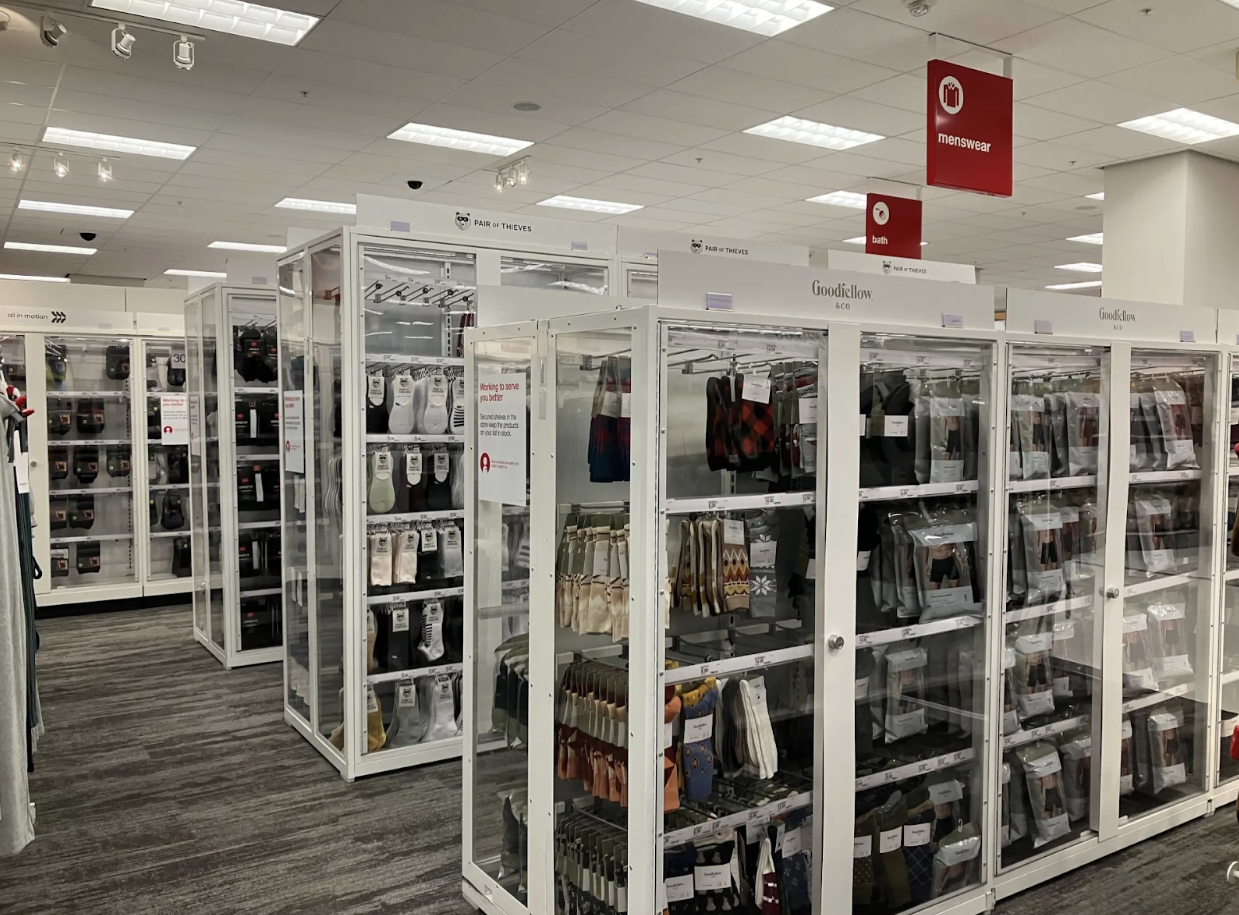Image from The San Francisco Standard. Top: Downtown San Francisco Target.
In a growing effort to combat retail theft, Bay Area stores like Target, Walmart, and Home Depot are now locking up basic items such as socks, underwear, and even toiletries. Shoppers have grown accustomed to seeing high-priced electronics and beauty products behind locked cabinets, but the shift to securing everyday essentials has caught many by surprise. This move is part of a strategy by retailers to reduce profit losses caused by shoplifting, but it’s sparking frustration and debate among customers.
This trend is not isolated to a few items; it reflects a broader response to escalating theft rates. For instance, the Walgreens on Geary Boulevard in San Francisco has reported as many as 15 to 20 thefts per day, prompting them to secure even basic necessities like toothpaste and lightbulbs. Employees have described a concerning atmosphere where shoplifting becomes a frequent occurrence, leading to nicknames for repeat offenders, such as “Santa,” who would fill garbage bags with stolen products. Customers are increasingly experiencing the impact of these security measures firsthand, with reports of waits of up to 90 seconds just to unlock items as simple as mouthwash.
For Washington High School students, who frequently shop at these stores, the new measures are making routine shopping more complicated. “It’s annoying to have to find an employee just to get something like socks,” said Ethan Donesa, a senior at WHS. “It takes way longer than it should, and it wasn’t like this a few years ago.”
Donesa believes the reason for locking up smaller-value items is to deter potential thieves and protect store employees. “A lot of people are more willing to shoplift small items because they think there won’t be serious consequences. But when it keeps happening, those small losses build up. Plus, it can even lead to physical harm if someone tries to stop a shoplifter. Stores are trying to avoid those liabilities,” he explained.
Some students expressed that the inconvenience of waiting for an employee to unlock products adds to the frustration. “I remember going to the store and waiting 10 minutes just to get a lightbulb,” Donesa shared. “With more items behind locked doors, it just creates another issue of people lining up.”
Nicholas Mason, another senior at WHS, also weighed in, noting how even his family has noticed the increase in locked-up items. “My dad complains about how ridiculous it’s getting with what stores are locking up,” he said. “I think about twice the number of things are locked up this year compared to last year.”
Mason believes that part of the reason for the rise in theft is the influence of social media on today’s youth. “Theft has always been an issue, but now I think social media encourages it,” he says. “People are driven by trends and algorithms that make shoplifting seem cool or harmless, and that’s affecting the behavior of young people.”
When asked how they would address retail theft, Donesa suggested focusing on broader societal issues. “A better way might be to fix inflation, but realistically, that’s hard. Maybe more severe punishments for shoplifting would help. It shouldn’t just be up to store owners to stop crime—it’s a societal problem. We need to teach that stealing is wrong and build a culture where people respect each other’s property.”
Mason, on the other hand, believes that change should start with the youth. “I’d keep the anti-shoplifting measures we have now, but we also need to send a different message to the youth. There’s too much focus on degeneracy and following social media trends. If young people could learn from older generations and resist the harmful influence of social media, we’d see a lot of improvement.”
As more stores adopt stricter security measures, students at WHS are beginning to see the effects firsthand. While the new policies are designed to prevent theft, they also raise concerns about convenience and what this shift means for the future of shopping. Ultimately, both Donesa and Mason agree that addressing the root causes of theft—whether through better education, societal change, or stronger consequences—will be key to solving the problem in the long term.
With new security measures in place, the debate over how to balance protecting profits and providing a positive shopping experience is just beginning. The conversation among WHS students highlights a broader question: how can we build a society that teaches respect and responsibility without sacrificing convenience?
Eric Ma, a senior at Washington High School, has spent his entire life in the Bay Area. This is his first year working for The Hatchet, and he aspires to capture campus life through photography. He is the WHS Aviation Club's founder and president, as well as a member of the Photography Club. Eric is a student pilot and photographer with over 1500 Instagram followers. He intends to attend a flight program at a university to become a commercial pilot or to join the US Air Force to become a fighter pilot.


